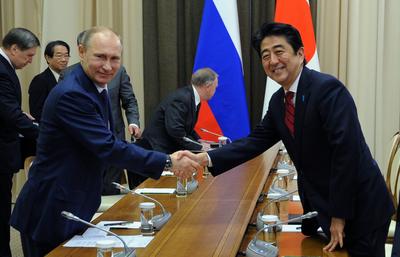But should the crisis deteriorate further, the G7 members may choose to resort to harsher sanctions. Doing so may upset the cautious diplomatic game Abe has been playing with Russia.
In his second term as prime minister, Abe has made Russia a focus of his personal diplomacy. He has met with President Vladimir Putin five times, more than with any other foreign leader. In April 2013 he became the first Japanese prime minister to visit Moscow in a decade, while in November last year Russia and Japan launched a new framework for cooperation in the form of ‘2+2’ negotiations between the countries’ foreign and defence ministers. Abe was also one of the few foreign leaders to visit the opening ceremony of the Winter Olympics in Sochi.
All of Abe’s diplomatic manoeuvres have been directed at a very tangible goal — that of renewing talks on the territorial dispute between Japan and Russia over the so-called Northern Territories (referred to in Russia as the Kuril Islands). Since 2003, negotiations have come to a halt and public interest has dropped significantly. Receiving an official recognition of the issue from Moscow, and renewing the negotiation process, could reinforce Japan’s position in its territorial disputes with China and South Korea — while boosting Abe’s domestic ratings. During his trip to Sochi, Abe invited Putin to his hometown in Yamaguchi Prefecture to discuss the Northern Territories, and Putin expressed an intention to visit Japan later this year.
However, Russia’s occupation and annexation of Crimea has put Japan in a daunting predicament.
Not supporting the G7’s sanctions against Russia would go against Japan’s traditional, low-risk, reactive foreign policy, and its asserted role as a responsible member of the international community. Yet supporting the sanctions might easily cancel out any recent improvement in Russo–Japanese relations and indefinitely stall any resolution of the territorial dispute.
There are also economic implications for Japan should it decide to extend sanctions. Currently Russia accounts for 7 per cent of Japan’s crude oil imports and 10 per cent of its liquefied natural gas imports. Taking an active anti-Russian stance may prove detrimental for Japan, which since the mothballing of its nuclear plants has become even more dependent on foreign energy resources. Japan may also lose its permission to fish in the Sea of Okhotsk, which is part of Russia’s exclusive economic zone.
Perhaps an even more relevant question is what sort of sanctions Japan would be able to effectively impose. Despite a trade turnover of about US$31 billion between the two countries, Japan’s overall share in the Russian economy is a meagre 4 per cent. Russian political and business elites neither own real estate in Japan nor keep their money in Japanese banks, meaning that visa bans and asset freezes are highly unlikely to make a substantial difference. Russia could also counter Japan’s export restrictions on machinery by switching to cheaper products made in China and South Korea.
Still, there is another reason why Tokyo should condemn Russia’s recent incursions into Ukraine. Putin’s decision to annex Crimea has created yet another precedent of a larger, militarily superior country seizing part of a smaller country based on historical grounds. That bodes especially badly for Japan in light of its smouldering conflict over the Senkakus with China.
So far, Japan’s official reaction to Crimea’s occupation has been restrained. In the wake of the Crimean referendum on 16 March the Ministry of Foreign Affairs issued a statement saying that Japan did not recognise its outcome. The Ministry also decided to take measures such as suspending talks around easing visa regulations, and freezing the launch of negotiations over several new agreements. Abe has also stated that Japan would provide Ukraine with a rescue package of about US$1.5 billion, a measure in line with Japan’s chequebook diplomacy. He also mentioned that Japan would not take part in the planned G8 meeting in Sochi in June this year
Given Tokyo’s inability to impose any serious sanctions on Moscow, and its carefully woven rapprochement strategy with Russia, it would be reasonable for Japan to limit itself to moderate,ceremonial sanctions and hope that Russia is too caught up in the Crimean crisis to pay attention to Japan’s reaction. Yet future events may well force Tokyo to make a definite decision.
Dmitry Filippov is a postgraduate student at the School of East Asian Studies, University of Sheffield.

